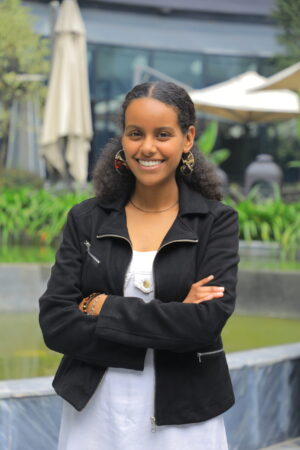Bisrat Dessalegn
Global Health'26

May 21, 2025
Why did you choose Rollins? And why did you decide to study Global Health with an MCH Certificate? What are your study interests?
I still remember the days of applying to universities, I got accepted into universities like Johns Hopkins, UNC-Chapel Hill, and Brown just to name a few. But Rollins stood out to me because of its human-centered approach to public health education. Unlike programs that focus purely on theory, Rollins prioritizes skills-based learning and cross-disciplinary collaboration. That resonated with me because I thrive in hands-on, real-world problem-solving environments.
What sealed the deal was how Rollins integrates global health beyond just health systems—and acknowledges the intersections of human rights, gender, economic empowerment, and policy. My passion lies in sexual and reproductive health and rights (SRHR), decolonizing global health, human rights and health, WASH (water, sanitation, and hygiene), and feminist economic policy. I’ve always been committed to advancing women’s rights in various dimensions and ensuring that gender equity is central to global health strategies—and I knew Rollins would give me the space to deepen that work.
What experiences did you bring with you to Rollins? Or what is your background?
Before Rollins, my career centered on SRHR, feminist research, global advocacy, and program implementation. As a Program Officer at EngenderHealth, I worked directly on projects addressing gender-based violence (GBV), youth-centered reproductive health, and disability-inclusive SRHR services in Ethiopia. I co-designed interventions, trained healthcare providers and law enforcement on gender equity, and helped set up school-based health clubs and safe spaces for young women.
Beyond program work, I have a strong research and advocacy background. As an Assistant Researcher at Includovate, I led qualitative research on unpaid care work and WEE, driving policy recommendations for gender-responsive economic strategies. I also co-authored publications on gender equity in global health leadership and childcare access in low-income settings.
In the global advocacy space, I’ve been actively involved in youth leadership within Knowledge SUCCESS at Johns Hopkins CCP, where I serve as a Youth Co-Chair for the NextGen Reproductive Health Community of Practice. Through this, I’ve worked on amplifying youth voices in SRHR policy, research, and knowledge-sharing platforms.
Could you talk about your experience with the UN, the conference you attended in DC, and other cool experiences you’ve had with global public health work?
I’ve had the privilege of being at the table for global conversations that shape the future of public health and gender equity. Some highlights include:
- Speaker at the UN Summit of the Future – I was invited to discuss transforming economies beyond GDP, emphasizing how care work and feminist economic policies should be central to economic planning.
- UN Financing for Development (FFD) Preparatory Mechanism – I contributed insights on how financial systems can be more gender-responsive and equitable in supporting global health initiatives.- Catch my recent blog here
- International Conference on Family Planning (ICFP) 2025 Youth Trailblazer – Recognized for my work in SRHR advocacy and feminist leadership in shaping youth engagement in family planning.
- Future of Family Planning Convening in Washington, D.C. – Engaged in dynamic discussions on how young leaders can shape the future of reproductive health services and policymaking, navigating the complexities of global politics, shifting funding landscapes, and evolving health priorities. Stay tuned for my upcoming reflection blog!
These experiences have solidified my commitment to ensuring global health policies are decolonized, gender-responsive, and inclusive of youth and marginalized communities.
What is or was your favorite experience at Rollins (academic or non-academic?)
As a first-year student, I’ve been deeply inspired by the mentorship and leadership development opportunities here. Working with faculty members who don’t just teach but actively advocate for equity, justice, and feminist leadership has been empowering. I thrive in spaces where my ideas are encouraged, and I’ve found that at Rollins, whether through research collaborations, class discussions, or the incredible network of peers committed to social justice.
What do you hope to do after graduating from Rollins?
While I am still exploring specific roles, I know that my next step will be in global policy advisory, feminist research, and technical work in SRHR, WEE, and WASH. I want to work on decolonizing global health by centering local expertise and shifting power to communities most impacted by inequitable policies.
I see myself in spaces where I can influence policy, drive feminist economic frameworks, and support evidence-based interventions that prioritize human rights and gender equity. Whether through qualitative research, program design, or global advocacy, I want my work to contribute to a world where health and economic systems serve, rather than exploit, communities in the Global South.
What do you enjoy doing most outside of public health?
If you know me, you know that K-Dramas are my guilty pleasure! I’ve probably watched more than I should admit, but they provide a needed escape from the intensity of the world.
I also love reading—especially books by African women authors, mystery thrillers, and social commentaries (my shift toward non-fiction is a sign I’m getting old, I suppose!). Beyond that, volleyball and running keep me active (I need to get back 🙂 , and I’m very intentional about building and maintaining a strong community of friends who uplift and support each other. I also stay connected with my family back home (Ethiopia), making sure to call and update them regularly. Being away from them is tough, but these conversations keep me grounded and remind me why I do this work.
